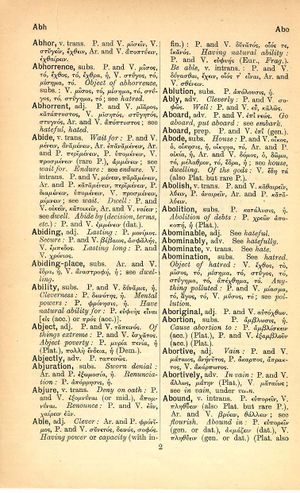able: Difference between revisions
From LSJ
Καλὸν τὸ θνῄσκειν, οἷς ὕβριν τὸ ζῆν φέρει → Quis foeda vita restat, his pulchrum est mori → Wem das Leben Schmach bringt, dem ist Sterben schön
(CSV2) |
mNo edit summary |
||
| Line 4: | Line 4: | ||
<b class="b2">Clever</b>: Ar. and P. [[φρόνιμος]], P. and V. [[συνετός]], [[δεινός]], [[σοφός]]. | <b class="b2">Clever</b>: Ar. and P. [[φρόνιμος]], P. and V. [[συνετός]], [[δεινός]], [[σοφός]]. | ||
<b class="b2">Having power</b> or | <b class="b2">Having power</b> or capacity (with infin.): P. and V. [[δυνατός]], οἷός τε, [[ἱκανός]]. | ||
<b class="b2">Having natural ability</b>: P. and V. [[εὐφυής]] (Eur., Frag.). | <b class="b2">Having natural ability</b>: P. and V. [[εὐφυής]] (Eur., Frag.). | ||
Revision as of 17:32, 22 September 2017
English > Greek (Woodhouse)
adj.
Clever: Ar. and P. φρόνιμος, P. and V. συνετός, δεινός, σοφός.
Having power or capacity (with infin.): P. and V. δυνατός, οἷός τε, ἱκανός.
Having natural ability: P. and V. εὐφυής (Eur., Frag.).
Be able, v. intrans.: P. and V. δύνασθαι, ἔχειν, οἷός τʼ εἶναι, Ar. and V. σθένειν.

